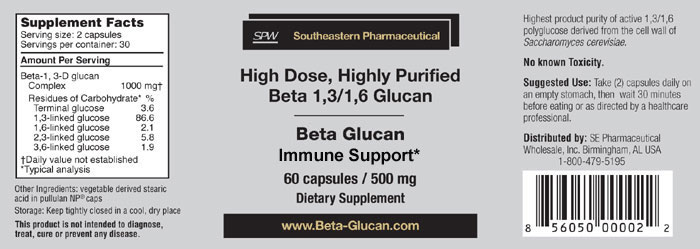

The positive effects of beta glucan in tumor therapy are multiple. One is the direct positive stimulation of macrophages and natural killer (NK) cells. Macrophages form the first line of defense and protect our body against any type of invading cells - including cancer cells. NK cells represent a special subtype of "bloodthirsty" lymphocytes, with a single function - to specifically recognize and kill tumor cells. Together, these cells form a defensive line guarding the integrity of our body. Their job isn't easy, and considering the fact that they perform this function without any breaks, it's easy to see how they can become exhausted - and could use all the help they can get.
Beta glucan binds to the surface of both macrophages and NK cells, interacts with the surface molecules, and triggers the activation processes. The result of this interaction is that the highly activated tumor killers circulate in our body and actively seek their preferred targets - cancer cells. Upon contact with these cancer cells they kill them in a specific way, so the surrounding tissue and organs remains intact and unharmed.
Beta glucan is able not only to stimulate the cells of the immune system to perform optimally, it also "cares" about their numbers. All cells involved in immune reactions originate from common precursors - mostly from bone marrow. The influx of new cells from bone marrow is steady, but limited, and here again, Beta glucan comes to the rescue. It stimulates the production of precursor cells in bone marrow, resulting in a more rapid flow of new immunocytes into the bloodstream and into the various lymphoid organs throughout the body.
Despite the fact that most tumors are recognized by the immune system, the antibody response is usually only light - and often not strong enough to destroy the cancer growth. Even a healthy immune system cannot adequately deal with fast-growing cancer cells alone. The situation can get serious very fast. Again, beta glucan comes to the rescue. It is able to "cooperate" with antibodies. After tumor cells are recognized as foreign, specific antibodies are formed, and subsequently bind to the cancer cells. Following the binding of antibodies, C3 fragments of complement coat the cancer cells, and then the beta glucan-primed cells - such as blood neutrophiles, macrophages, and natural killer cells, specifically recognize these complement-antibody complexes. Without the beta glucan-derived activation of cells, the cancer cells remain coated, but no killing occurs.
These events alone would be enough to consider beta glucan one of the most significant anti-cancerous immunostimulants we know, but beta glucan has still another ace up its sleeve. In addition to the specific priming of cell surface receptors, beta glucan is able to create nonspecific stimulation of the immune system via the release of biologically important molecules. Upon entering the blood stream, beta glucan activates various cells of the body to release numerous biological factors, and signals molecules known to influence our defensive systems. Among these factors are: tumor necrosis factor (TNF), interleukins 1 and 6, hydrogen peroxide, and interferon, all of which are proven effective in our fight against cancers and other invading microorganisms. In addition to the direct effects on tumor cells, the synthesis and release of these signals has also a direct impact on macrophages and lymphocytes capable of producing other cytokines. In this nonspecific way, beta glucan helps to boost defensive reactions by triggering the whole complicated cascade of events leading to a fully armed immune system.
Despite great achievements and decades of intensive research, the incidence of various tumors and cancers is still increasing rapidly. The National Cancer Institute estimates that 1 in 5 humans in the U.S. are likely to get cancer in their lifetimes. This qualifies as a bona-fide epidemic! More and more people are living under stressful and relatively toxic conditions, and the ability to boost immunity by easily obtained, commercially available immunostimulants is extremely important. Investigations of various beta-glucan's affecting immune reactions are currently the focus of intensive preclinical and clinical investigation on several parts of the globe. Based on the results available today we can say that beta glucan is clearly one of the most important substances available to us in the ongoing fight against cancer.
By Vaclav Vetvicka, Ph.D. Associate Professor at the Department of Pathology, Division of Experimental Immunology and Immunopathology of the School of Medicine, University of Louisville
High Dose, Highly Purified Beta Glucan:

Questions 1-800-479-5195 (8/5 weekdays).
Southeastern Pharmaceutical
Birmingham, AL 35244
All orders are shipped the same day, if received by 3 PM CST weekdays.